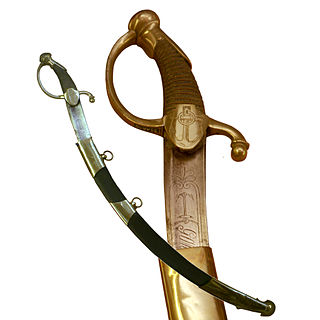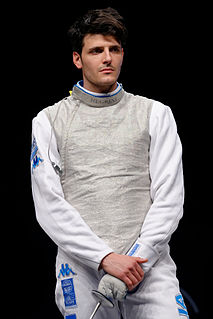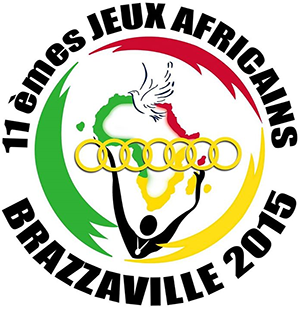
Fencing is a group of three related combat sports. The three disciplines in modern fencing are the foil, the épée, and the sabre ; winning points are made through the weapon's contact with an opponent. A fourth discipline, singlestick, appeared in the 1904 Olympics but was dropped after that, and is not a part of modern fencing. Fencing was one of the first sports to be played in the Olympics. Based on the traditional skills of swordsmanship, the modern sport arose at the end of the 19th century, with the Italian school having modified the historical European martial art of classical fencing, and the French school later refining the Italian system. There are three forms of modern fencing, each of which uses a different kind of weapon and has different rules; thus the sport itself is divided into three competitive scenes: foil, épée, and sabre. Most competitive fencers choose to specialize in one weapon only.

A sabre is a type of backsword with a curved blade associated with the light cavalry of the early modern and Napoleonic periods. Originally associated with Central European cavalry such as the hussars, the sabre became widespread in Western Europe during the Thirty Years' War. Lighter sabres also became popular with infantry of the early 17th century. In the 19th century, models with less curving blades became common and were also used by heavy cavalry.

The épée, sometimes spelled epee in English, is the largest and heaviest of the three weapons used in the sport of fencing. The modern épée derives from the 19th-century épée de combat, a weapon which itself derives from the French small sword.

Historical European martial arts (HEMA) are martial arts of European origin, particularly using arts formerly practised, but having since died out or evolved into very different forms.

The Fédération Internationale d'Escrime, commonly known by the acronym FIE, is the international governing body of Olympic fencing. Today, its head office is at the Maison du Sport International in Lausanne, Switzerland. The FIE is composed of 157 national federations, each of which is recognized by its country's Olympic Committee as the sole representative of Olympic-style fencing in that country.

Fencing has been contested at every Summer Olympic Games since the birth of the modern Olympic movement at the 1896 Summer Olympics in Athens. There are three forms of Olympic fencing:

The Secure Fence Act of 2006, also labelled H.R. 6061, is an act of the United States Congress which authorized and partially funded the construction of 700 miles (1,125 km) of fencing along the Mexican border. The Act was signed into law on October 26, 2006, by U.S. President George W. Bush, who stated at the time that the Act would "help protect the American people", would "make our borders more secure", and was "an important step toward immigration reform".

Andrea Cassarà is an Italian left-handed foil fencer, two-time individual European champion, 2011 individual world champion, and three-time Olympics medalist.
The men's team épée was one of eight fencing events on the fencing at the 1968 Summer Olympics programme. It was the thirteenth appearance of the event. The competition was held from 24 to 25 October 1968. 91 fencers from 20 nations competed. For the first time in 60 years, Italy failed to finish in the top three positions.
The men's team foil was one of eight fencing events on the fencing at the 1968 Summer Olympics programme. It was the twelfth appearance of the event. The competition was held from 18 to 19 October 1968. 79 fencers from 17 nations competed.
The women's team foil was one of eight fencing events on the fencing at the 1968 Summer Olympics programme. It was the third appearance of the event. The competition was held from 23 to 24 October 1968. 52 fencers from 10 nations competed.
The men's team épée was one of eight fencing events on the fencing at the 1972 Summer Olympics programme. It was the fourteenth appearance of the event. The competition was held from 8 to 9 September 1972. 94 fencers from 20 nations competed.
The men's team foil was one of eight fencing events on the fencing at the 1972 Summer Olympics programme. It was the thirteenth appearance of the event. The competition was held from 1 to 2 September 1972. 63 fencers from 13 nations competed.
The men's team épée was one of eight fencing events on the fencing at the 1980 Summer Olympics programme. It was the sixteenth appearance of the event. The competition was held from 30 to 31 July 1980. 52 fencers from 11 nations competed.
The men's team foil was one of eight fencing events on the fencing at the 1980 Summer Olympics programme. It was the fifteenth appearance of the event. The competition was held from 25 to 26 July 1980. 40 fencers from 9 nations competed.

The men's sabre was one of eight fencing events on the fencing at the 1980 Summer Olympics programme. It was the nineteenth appearance of the event. The competition was held from 24 to 25 July 1980. 30 fencers from 12 nations competed. Nations had been limited to three fencers each since 1928. The event was won by defending champion Viktor Krovopuskov of the Soviet Union, the nation's third consecutive victory in the event. Krovopuskov was the third man to successfully defend a sabre title and the 10th man to win two medals of any color in the event. His teammate Mikhail Burtsev took silver. Imre Gedővári's bronze medal returned Hungary to the podium after a one-Games absence broke an eleven-Games streak.

The 11th African Games took place from September 4–19, 2015 in Brazzaville, Republic of the Congo. This edition marked the 50th anniversary of the Games, as well as their return to Brazzaville, which hosted the first edition in 1965.
The men's team sabre was one of eight fencing events on the fencing at the 1992 Summer Olympics programme. It was the nineteenth appearance of the event. The competition was held from August 6 to 7, 1992. 59 fencers from 12 nations competed.

The fencing competitions at the 2016 Summer Olympics in Rio de Janeiro took place from 6 to 14 August at the Carioca Arena 3 inside the Barra Olympic Park in Barra da Tijuca. Around 212 fencers competed in 10 events -- six individual and four team.

The fencing competitions at the 2020 Summer Olympics in Tokyo featured 12 events, the first time that both team and individual events have been held in all three weapons for both men and women.












